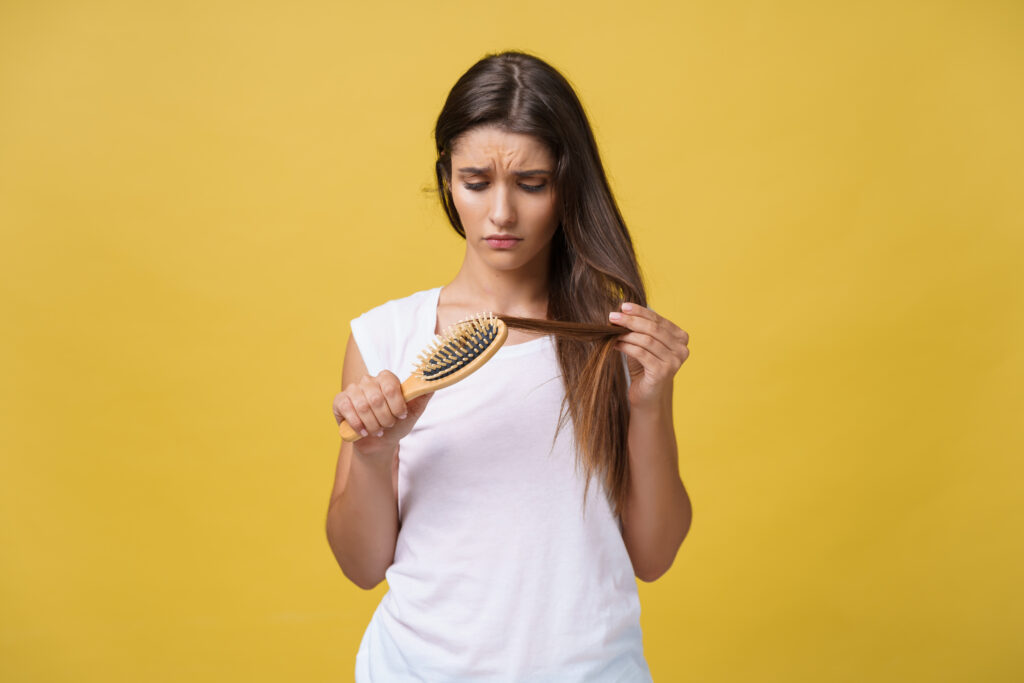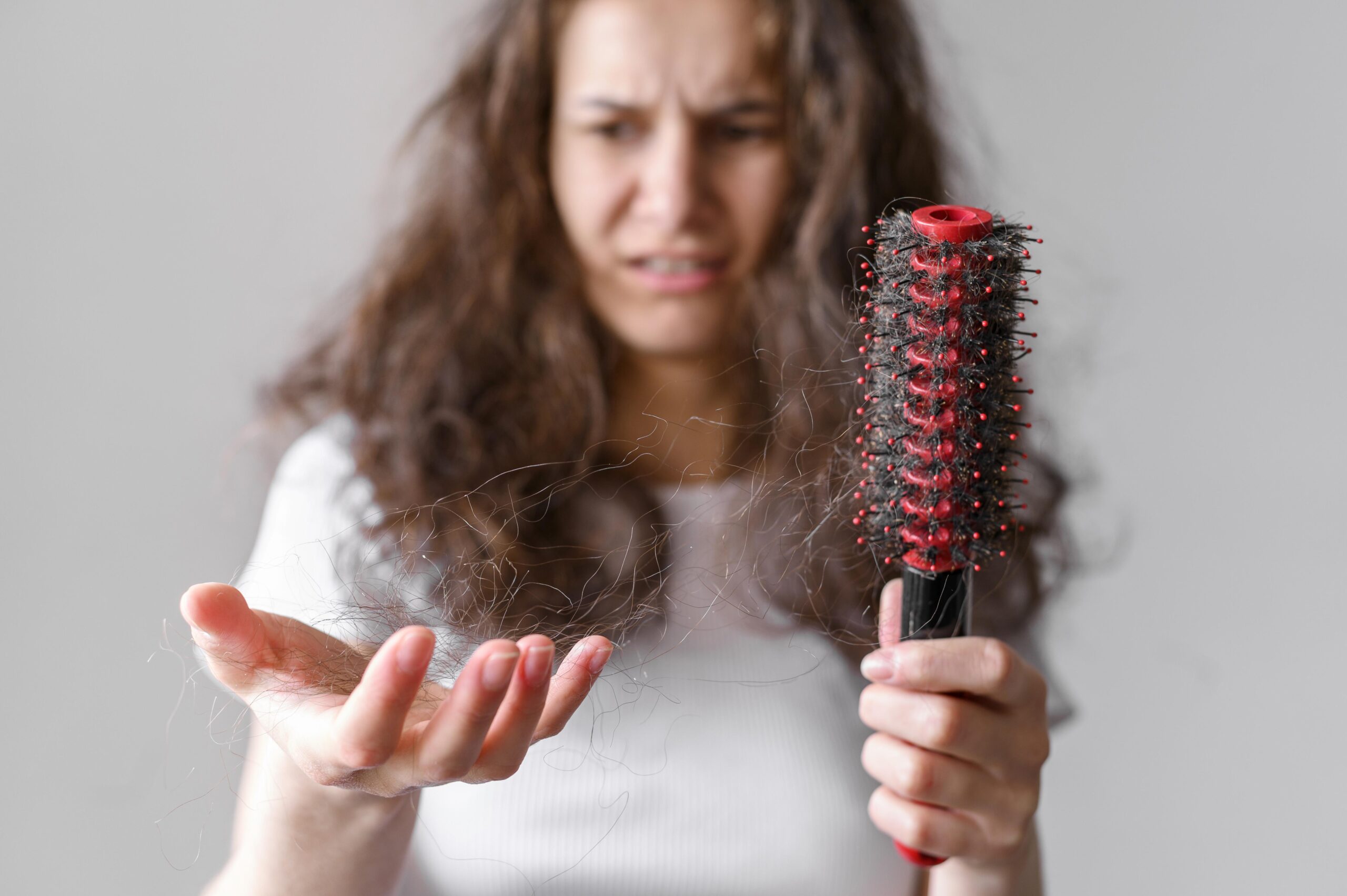Hair loss is a universal concern that affects both men and women at different stages of life. Understanding the root of the problem is the first step to dealing with it. According to statistics, by age 50, around 85% of men show signs of hair thinning, and over 30% of women experience noticeable hair loss in their lifetime.
When you know the major hair loss causes, you’re better equipped to apply prevention strategies that actually work. Rather than relying only on expensive treatments, studies show that simple lifestyle changes such as improving nutrition, managing stress, and protecting scalp health can significantly slow down shedding and support thicker hair.
In this blog, we’ll break down the 5 top hair loss causes and share practical prevention tips you can easily try at home.
5 Common Hair Loss Causes
There are multiple hair loss causes, and they often vary depending on age, genetics, lifestyle, and even health conditions. Understanding these causes helps in choosing the right prevention and treatment strategies. Below, we’ll break down the 5 most common reasons behind thinning hair and excessive shedding.

1. Genetics (Androgenetic Alopecia)
One of the most frequent hair loss causes is genetics, also called androgenetic alopecia. This inherited condition leads to patterned baldness in men and diffuse thinning in women.
It typically begins with a receding hairline or thinning crown in men, while women experience a gradual widening of the part line. Studies suggest that this type of hair loss is influenced by sensitivity to dihydrotestosterone (DHT), a hormone that shrinks hair follicles over time.
Because genetic hair loss is progressive, it often worsens with age if untreated. However, early intervention with treatments such as minoxidil, finasteride (for men), or platelet-rich plasma (PRP) therapy can slow down follicle shrinkage. Recognizing genetics as one of the major hair loss causes is important because it cannot be fully prevented, but it can often be managed with the right medical support.
2. Hormonal Imbalance
Hormonal changes are another significant category of hair loss causes, particularly for women. Conditions like pregnancy, menopause, polycystic ovary syndrome (PCOS), and thyroid disorders can trigger fluctuations that directly impact the hair growth cycle.
For example, low estrogen during menopause often leads to thinner, weaker strands, while excess androgens in PCOS may cause male-pattern baldness in women.
These hormone-related hair loss causes often come with other symptoms such as irregular periods, acne, or weight changes, making it easier to identify the underlying issue.
Treatments may include hormone therapy, thyroid medications, or lifestyle adjustments to restore balance. In many cases, addressing the root hormonal imbalance also improves overall scalp health and hair density.
3. Stress and Anxiety
Among lifestyle-related hair loss causes, stress plays a powerful role. Both physical and emotional stress can shock the hair follicles into a resting phase, leading to telogen effluvium, where large amounts of hair shed at once. People often notice increased shedding a few months after stressful events like surgery, illness, or emotional trauma.
Chronic anxiety and stress not only disrupt the natural hair cycle but may also lead to habits like hair-pulling (trichotillomania), which worsen the issue. These stress-related hair loss causes are often temporary, and once the stressor is managed, hair growth can return to normal.
Practices like meditation, yoga, and regular sleep have been shown to help reduce stress-induced shedding significantly.
4. Nutritional Deficiency
Poor nutrition is one of the most overlooked hair loss causes. Hair follicles require a steady supply of vitamins and minerals to grow strong, and deficiencies in iron, vitamin D, zinc, or vitamin B12 can lead to weak, brittle strands that fall out easily.
For example, iron deficiency anemia is a well-documented cause of excessive shedding, particularly in women of childbearing age.
Fortunately, nutritional hair loss causes are often reversible with dietary improvements. Incorporating leafy greens, lean proteins, eggs, nuts, and whole grains can restore essential nutrients and support stronger follicle health.
In some cases, doctors may recommend supplements or blood tests to identify specific deficiencies. Balanced nutrition is one of the easiest ways to prevent unnecessary hair thinning at home.
5. Scalp Conditions
When looking at scalp-related hair loss causes, conditions like dandruff, psoriasis, seborrheic dermatitis, and fungal infections are common triggers. These conditions inflame the scalp, weaken the follicles, and disrupt the natural growth environment.
For example, psoriasis can create thick, scaly patches that suffocate follicles, while fungal infections may destroy them altogether if untreated.
ALOS READ
Dandruff vs Psoriasis on Scalp – Causes, Symptoms & Key Differences
Treating these hair loss causes often requires targeted medicated shampoos, antifungal treatments, or dermatologist-prescribed topical medications. Maintaining scalp hygiene is crucial because a clean and balanced scalp promotes healthy hair growth. Addressing these issues early helps prevent long-term damage to the hair follicles.
Hair Loss Prevention Tips That You Can Try at Home
Understanding the different hair loss causes is only half the battle. The next step is taking practical actions at home to minimize shedding and encourage healthier growth. While not every type of hair loss can be fully prevented (such as genetics), these at-home prevention strategies can significantly strengthen your hair and improve scalp health.
Maintain a Balanced Diet
Since nutritional deficiencies are one of the most common hair loss causes, diet plays a vital role in prevention. Consuming foods rich in protein, iron, zinc, vitamin D, and B vitamins helps provide the raw materials for strong and healthy follicles. Eggs, salmon, spinach, beans, and nuts are excellent sources of these nutrients. Research published in Dermatology and Therapy highlights that deficiencies in iron and vitamin D are strongly associated with hair shedding, particularly in women.
Focusing on a nutrient-dense diet not only improves hair quality but also supports your overall health. In many cases, nutritional hair loss causes can be corrected within months of dietary improvements. If you suspect deficiencies, consult your doctor for blood tests before starting supplements to avoid overdosing.
Manage Stress Effectively
Stress is among the leading lifestyle-related hair loss causes, and it can significantly disrupt the normal hair growth cycle. Chronic stress leads to telogen effluvium, where follicles enter a resting phase, causing noticeable shedding. Research from JAMA Dermatology confirms that psychological stress contributes to both acute and chronic hair loss patterns.
Incorporating relaxation practices like yoga, meditation, deep breathing, or even daily walks can lower stress hormones and improve scalp health.
Addressing stress-related hair loss causes is not just about hair, it also enhances mental well-being. Making stress management a daily habit is one of the most effective at-home strategies for stronger, fuller hair.
Keep Your Scalp Clean and Healthy
Poor scalp hygiene is often overlooked but can worsen many hair loss causes, especially dandruff, seborrheic dermatitis, or fungal infections. Regularly washing your scalp with a gentle, sulfate-free shampoo helps remove excess oil, dirt, and buildup that may clog follicles.
According to the American Academy of Dermatology, keeping the scalp clean reduces irritation and promotes a healthier environment for hair growth. A healthy scalp enhances circulation, allowing treatments such as oils or medicated shampoos to work more effectively.
For scalp-related hair loss causes, combining good hygiene with medicated products (when needed) ensures long-term results and healthier growth.
Avoid Excessive Heat and Chemicals
Among the preventable hair loss causes, harsh styling practices are the easiest to control. Excessive use of blow dryers, straighteners, curling irons, or chemical treatments (like dyes and relaxers) damages the hair shaft, leading to breakage and weakened follicles. Dermatology research confirms that repeated chemical and heat styling significantly increases the risk of hair thinning and breakage.
To prevent these styling-related hair loss causes, reduce heat exposure, allow hair to air-dry whenever possible, and use protective serums before heat styling. Choosing natural hairstyles and minimizing chemical processes will help preserve hair strength and thickness over time.
Massage Your Scalp Regularly
Scalp massage is a simple, natural way to combat certain hair loss causes, as it boosts blood circulation to the follicles. Increased circulation delivers oxygen and nutrients, which can help prolong the growth phase of the hair cycle.
For individuals dealing with stress or mild thinning, scalp massages with oils like coconut, castor, or rosemary oil may provide additional nourishment. This technique helps counteract multiple hair loss causes, from stress-induced shedding to weakened follicles due to poor circulation.
What’s Next
Knowing your exact hair loss causes is the most important step toward treatment. For some, improving diet and reducing stress may stop shedding, while others may need medical guidance. While genetics can’t be changed, many other hair loss causes are preventable with small but consistent at-home practices. The key is patience, healthy hair restoration takes time and commitment.
FAQs
What are the most common hair loss causes?
The most common hair loss causes include genetics, hormonal imbalances, stress, nutritional deficiencies, and scalp conditions. Lifestyle factors like excessive heat styling or harsh chemicals also play a role. Understanding these hair loss causes helps in choosing the right treatment and prevention methods.
Can a poor diet really contribute to hair loss?
Yes, diet plays a big role in hair loss because hair needs essential nutrients like iron, zinc, vitamin D, and protein to grow. A poor diet weakens follicles and makes shedding worse. Correcting these hair loss causes through nutrition often improves hair health within months.
How do stress and anxiety are linked to hair loss?
Stress is one of the most underestimated hair loss causes, as it disrupts the natural hair growth cycle. High stress levels push hair follicles into a resting phase, causing increased shedding. Managing stress helps reduce this trigger among other hair loss causes.
Can scalp hygiene prevent your hairfall?
Yes, poor scalp hygiene is one of the overlooked hair loss causes. Dandruff, buildup, or infections can weaken follicles if the scalp isn’t clean. Regular washing with mild shampoos helps reduce these hair loss causes and creates a healthy environment for growth.



Join The Discussion